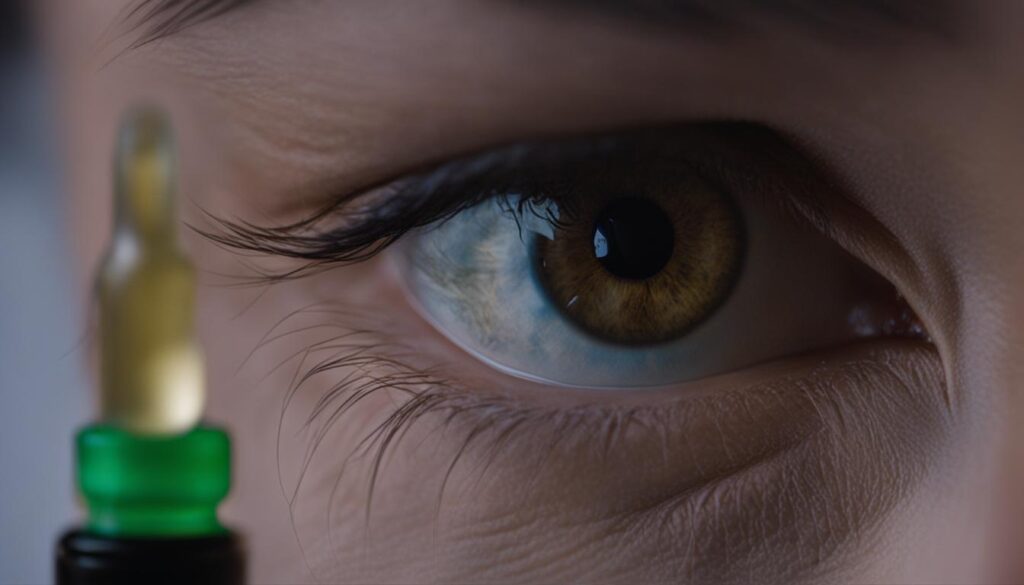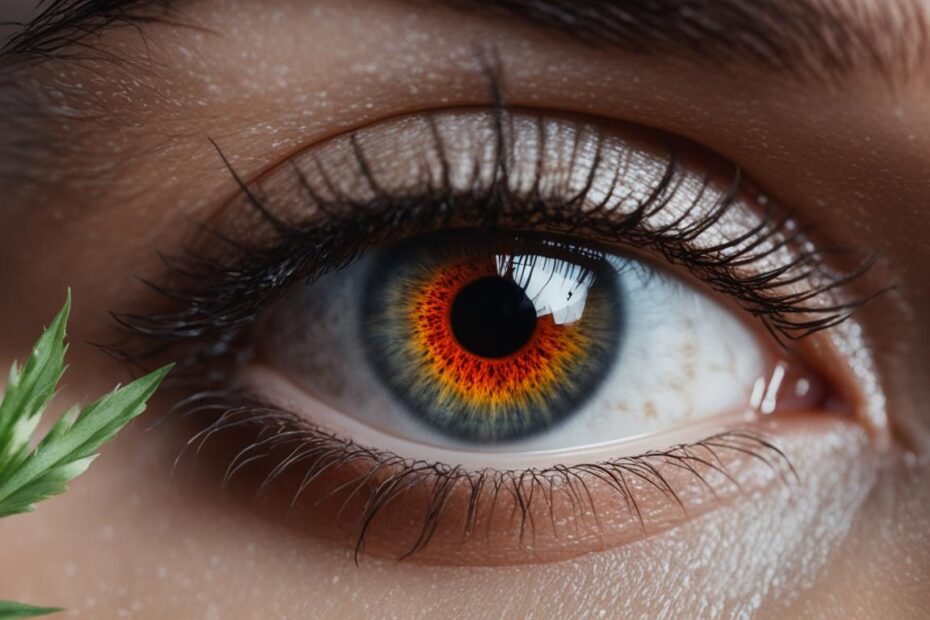Are you looking for a natural way to improve your eye health? Castor oil has been touted for its potential benefits in treating various eye conditions, but it’s essential to separate fact from fiction. While castor oil does contain ricinoleic acid, known for its anti-inflammatory and moisturizing properties, its effectiveness for serious eye conditions like cataracts and glaucoma is unproven. In fact, using unsterilized bottles or containers to apply castor oil around the eyes can even pose risks of allergic reactions and infections.
However, there are some benefits of castor oil for eye health. It can help improve hydration and reduce irritation, making it a natural remedy for dry eyes and blepharitis. Castor oil eye drops, when used correctly, offer potential benefits for conditions like Meibomian gland dysfunction (MGD), a common cause of dry eyes.
Key Takeaways:
- Castor oil may not be effective for treating serious eye conditions like cataracts and glaucoma.
- Using unsterilized bottles or containers to apply castor oil around the eyes can pose risks of allergic reactions and infections.
- Castor oil can improve hydration and reduce irritation, making it suitable for dry eyes and blepharitis.
- Castor oil eye drops offer potential benefits for conditions like Meibomian gland dysfunction (MGD).
- It’s important to follow proper application techniques and seek advice from an eye care professional when using castor oil eye drops.
The Truth Behind Castor Oil Eye Claims
When it comes to the claims surrounding castor oil and its effects on eye conditions, it’s important to approach them with caution. While castor oil may have some benefits for certain aspects of eye health, its ability to improve eyesight or cure conditions like cataracts and glaucoma is not supported by scientific research.
While some proponents suggest that castor oil can slow down the progression of cataracts, there is no evidence to suggest that it can actually improve vision or correct refractive errors. Similarly, while castor oil may be used as a treatment for glaucoma, it is typically used as an agent to help deliver medication rather than a standalone remedy.
However, it’s important to note that castor oil does have potential benefits for other aspects of eye health. Its anti-inflammatory and antimicrobial properties can be beneficial for conditions like dry eye and blepharitis. Castor oil can help improve tear stability and promote the growth of eyelashes and eyebrows.
While castor oil may not be a miraculous cure for eye conditions, it can still play a role in maintaining overall eye health.
To understand the true effects of castor oil on eye conditions, it’s crucial to prioritize evidence-based approaches and consult with a healthcare professional. They can provide accurate diagnosis, treatment, and guidance for maintaining good eye health.
Potential Benefits of Castor Oil for Eye Health
While the claims surrounding castor oil and its ability to cure eye conditions may be unsubstantiated, it does have potential benefits for certain aspects of eye health. Some of these include:
- Improving tear stability
- Reducing inflammation
- Promoting eyelash and eyebrow growth
This natural oil can be a useful addition to a comprehensive eye care routine, especially for individuals experiencing dry eye or blepharitis.
Using Castor Oil for Eye Health
When using castor oil for eye health, it’s important to follow proper application techniques. Here are some guidelines to keep in mind:
- Ensure your hands are clean before application.
- Tilt your head back and gently pull down the lower lid to create a pouch.
- Squeeze one drop of castor oil into the pouch.
- Avoid wiping your eye and let the oil spread naturally.
- If any liquid spills onto your face, pat it dry with a clean towel.
It’s also essential to use castor oil that is specifically meant for eye use and is sterile. If you experience any allergic reactions or side effects, discontinue use and consult a healthcare professional.
Benefits of Castor Oil Eye Drops
When it comes to treating certain eye conditions, castor oil eye drops can offer several potential benefits. These drops have been shown to be effective in addressing Meibomian gland dysfunction (MGD), a common cause of dry eyes. By improving tear stability and reducing evaporation, castor oil eye drops help alleviate the discomfort and irritation associated with dry eye.
What sets castor oil eye drops apart is their organic nature, making them a desirable alternative to conventional over-the-counter eye drops. Unlike synthetic drops that may contain additives and preservatives, castor oil eye drops are a natural and chemical-free option. This makes them a preferred choice for individuals seeking an organic and holistic approach to eye care.
In addition to their organic properties, castor oil eye drops have the advantage of providing long-lasting relief. Once applied, the oil can remain in the eyes for up to four hours, providing extended hydration and lubrication. This long-lasting effect ensures continuous relief from dryness and discomfort throughout the day, reducing the need for frequent reapplication.
However, it is important to note that proper application techniques and guidance from an eye care professional are crucial for maximizing the benefits of castor oil eye drops. Incorrect usage or excessive application can lead to adverse effects, so it’s essential to follow the recommended dosage and seek advice from a qualified eye care specialist.
Overall, the benefits of castor oil eye drops make them a promising option for individuals experiencing dry eye and looking for an organic alternative to conventional eye drops. The natural, long-lasting relief they provide, coupled with their chemical-free composition, make them an attractive choice for those seeking effective and holistic eye care solutions.
How to Use Castor Oil Eye Drops Safely
When it comes to using castor oil eye drops, following the proper application techniques is crucial to ensure both safety and effectiveness. Here are some steps to guide you:
-
Start by washing your hands thoroughly to avoid introducing any bacteria or dirt into your eyes.
-
Tilt your head back slightly to create a comfortable angle for the application process.
-
Gently pull down your lower eyelid to create a small pouch.
-
Squeeze one drop of castor oil into the pouch you created with your lower eyelid. Be careful not to touch your eye with the dropper to prevent contamination.
-
Avoid wiping your eye after applying the drop. Allow the drop to spread naturally across your eye and eyelid.
-
If any liquid spills onto your face during the application, pat it dry gently with a clean towel.
-
It’s crucial to note that the castor oil used for external purposes should not be applied inside your eyes. Always make sure to use purified and sterile forms of castor oil specifically meant for eye care.
If you experience any allergic reactions or side effects after using castor oil eye drops, discontinue use immediately and consult with a healthcare professional or an eye care specialist for further guidance.

Remember, using castor oil eye drops properly is essential for your eye health and overall well-being. By following these application techniques, you can maximize the benefits of castor oil and ensure a safe and effective experience.
Conclusion
While the effectiveness of castor oil for specific eye conditions lacks concrete scientific evidence, it still has a role to play in maintaining good eye health. To ensure the longevity of your vision, it is crucial to incorporate various aspects of eye care into your routine.
Regular comprehensive eye exams are essential for early detection and management of any potential problems. Additionally, managing chronic health conditions, such as diabetes and hypertension, can reduce the risk of developing eye-related complications.
Adopting a healthy lifestyle that includes regular exercise, adequate sleep, and stress management can also promote good eye health. Consuming a nutrient-rich diet, rich in antioxidants like vitamins C and E, zinc, and omega-3 fatty acids, can support eye health and reduce the risk of age-related macular degeneration and dry eyes.
Furthermore, it is crucial to avoid smoking, as it has been linked to an increased risk of developing cataracts, macular degeneration, and other eye-related complications. Protecting your eyes from harmful UV rays by wearing sunglasses and hats when outdoors, knowing your family’s eye health history, using proper lighting to reduce eye strain, and practicing proper hygiene with contact lenses can also contribute to maintaining good eye health.
In conclusion, while castor oil may not be the miracle remedy it is often portrayed to be, it is just one piece of the puzzle when it comes to maintaining healthy eyes. By combining various practices and seeking professional help from eye care providers, you can ensure accurate diagnosis, appropriate treatment, and the preservation of your vision.
FAQ
Is castor oil effective for treating eye conditions like cataracts and glaucoma?
No, there is no scientific evidence to support the claim that castor oil can effectively treat cataracts and glaucoma. While it may help slow down the progression of cataracts, it does not improve vision or change refractive error. Castor oil can be used as an agent to help deliver medication for glaucoma, but it is not a standalone treatment.
What are the benefits of castor oil eye drops?
Castor oil eye drops can be beneficial for treating Meibomian gland dysfunction (MGD), a common cause of dry eyes. They improve tear stability, reduce evaporation, and offer lasting effects of up to 4 hours. Castor oil eye drops also provide an organic alternative to typical over-the-counter eye drops.
How should I use castor oil eye drops safely?
To use castor oil eye drops safely, wash your hands before application. Tilt your head back, gently pull down the lower lid, and squeeze one drop into the pouch formed. Avoid wiping your eye and let the drop spread naturally. If liquid spills onto your face, pat it dry with a clean towel. It’s important to use purified, sterile forms of castor oil and avoid using castor oil meant for external use only inside the eyes.
Does castor oil have concrete scientific evidence to support its effectiveness for eye conditions?
No, there is no concrete scientific evidence supporting the effectiveness of castor oil for certain eye conditions. However, it can play a role in maintaining good eye health when combined with other measures such as regular comprehensive eye exams, managing chronic health conditions, maintaining a healthy lifestyle, consuming a nutrient-rich diet, protecting eyes from the sun, and practicing proper hygiene with contact lenses.
When should I seek professional help for my eye health?
It is always best to seek professional help from eye care providers for accurate diagnosis, treatment, and preservation of vision. They can provide you with the appropriate guidance and recommendations based on your individual needs and concerns.
